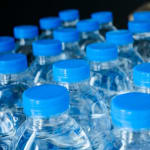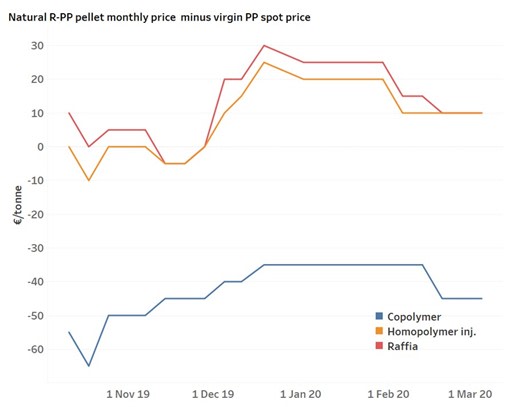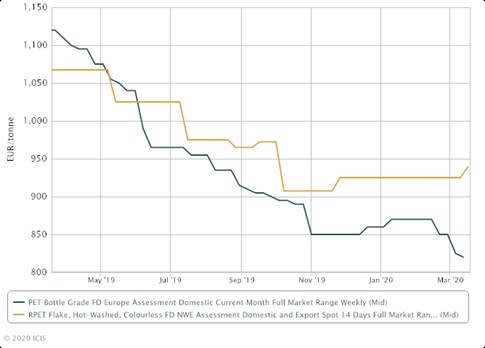
Concerns over the long-term impact of the coronavirus outbreak on key European recycling markets sharply escalated this week following the adoption of further containment measures across the continent.
Sources are particularly worried about limited volumes entering collection systems, logistic disruptions, potential downstream demand losses in non-packaging sectors, buyers abandoning sustainability measures and a reduction in necessary long-term investment.
Even at the end of last week, concerns in the recycling industry had only been limited to the impact on virgin prices - with which recycled material competes - and individual customer relationships in countries such as Italy.
The coronavirus has had a major impact on petrochemicals, hindering global supply chains, changing consumer demand patterns and prompting wide swings in the markets. At the same time, crude has plunged in the wake of the ongoing price war between Saudi Arabia and Russia - which is also being felt in virgin plastics markets across Europe.
In the meantime, the recycling markets have largely been trading normally, albeit with some additional buyer caution. This, however, is beginning to shift.
Sources in the recycled polyethylene terephthalate (R-PET) market - the most widely recycled plastic across Europe - are already seeing a change in consumer behaviour, particularly around buying habits, and more importantly, recycling habits.
“People are buying [bottled] water and they don't bring it back, they store it,” a German recycler said on Tuesday. Demand for virgin PET has already increased significantly in March as Europeans began to panic buy food and other necessities.
“On the one hand, it's a regular seasonal effect in February and March - it’s winter so people drink less [bottled drinks]. But on the other, purchasing has increased big time, so [consumers] store [bottles] at home, [and] some have switched to glass,” the recycler added.
Sources in Germany, which has one of the most established deposit return schemes (DRS) in Europe – where consumers return their used PET bottles via reverse vending machines in locations like supermarkets – are waiting to assess the impact of social distancing and self-isolation on the recycling market.
Many will be looking at how used PET bottles are returned to the recycling stream during the outbreak as it comes at a time when post-consumer bottle availability is already tight due to the previously mentioned drop in bottled-drinks consumption.
This is also likely to have an effect on seasonal trends associated with the consumption of bottled drinks. If social distancing is still in effect during the summer, people may not go out as much, resulting in less R-PET availability. Some said the coronavirus may cause more people to turn to tap water or use glass bottles over plastic.
A similar trend of reduced collection rates is expected in other key recycled polymer sectors such as recycled polyethylene (R-PE) and recycled polypropylene (R-PP).
“We plan that we will have less material getting in to our plants in the next weeks,” a major French waste collector and reprocessor said.
Reduced collection rates typically take several weeks to be felt in the market because of the time it takes post-consumer or post-industrial material to work through the chain. This means that any shortages most likely will be felt during what would typically be the beginning of the peak season for R-PET and recycled polyolefins (R-PO). Nevertheless, given the demand uncertainty it is unlikely that the 2020 peak season will be typical.
The impact on demand for R-PO is likely to be divided by end-use market. Key end-use markets for R-PO include automotive, construction, bin bags, outdoor furniture and packaging. Automotive demand has already fallen sharply because of the outbreak, and it is likely to decline further after temporary closures at automotive manufacturers across Europe.

The construction industry is more protected from any direct production impact caused by the coronavirus, but is likely to be heavily affected by any economic downturn. Outdoor furniture demand, meanwhile, is also likely to suffer due to isolation measures.
In contrast, packaging demand is expected to soar. Buyers are expected to favour plastic-wrapped food driven by hygiene concerns, and because of the widepsread use of polyolefins in packaging cleaning and hygiene products.
Nevertheless, the extent to which this will benefit the recycling industry remains unclear. Several sources suggest that the pandemic will take the focus off sustainability targets in the short term. They also expect brand owners to switch back to virgin, which may be more readily available.
Because the price for products such as colourless R-PET flakes and food-grade pellets, high density polyethylene (R-HDPE) natural and food-grade pellets and R-PP natural pellets are all now higher than virgin material, it only adds to the possibility of further substitution back to virgin.



